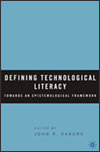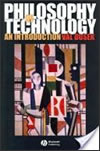Element 1 Aspect 2: Views of Technology
Teacher Education – Pre-service
Describes how and why people's views of technology are influenced by their values, experiences and understandings of different theoretical perspectives.
Aspect Purpose: To support student teachers to develop a view of technology through exploring different people's views.
Key words: Value laden, values, experiences.
Resources
Book Chapter
Feenberg, A., What is Philosophy of Technology. In Dakers, J.R. (Ed). (2006). "Towards a Philosophy for Technology Education", in Defining Technological Literacy: Towards an Epistemological Framework, pp.7 - 16. Palgrave Macmillan, New York and London.
Feenberg engages in a philosophical debate that examines the philosophy of technology from both a contemporary and historical perspective. He examines two possible and contrasting definitions of technology. In this chapter, Feenberg also considers technologists and technologies impact on modern society using a range of theoretical perspectives.
Keywords: Philosophy; Determinism; Instrumentalism; Value-laden; Substantivism; Critical theory.
Reviewed by: Bruce Granshaw
Book Chapter
Conway, R., & Riggs, A. (1994). "Valuing in Technology", in Banks, F. (Ed.). Teaching Technology (pp.227-235). London: Routledge.
This chapter picks up on issues related to science, technology and society, and economic awareness from previous articles. It considers the values that are believed to be implicit in technological solutions. Beginning with a discussion, this chapter explores how people's beliefs and constructs are allied to their value positions. The authors move on to three questions which are woven into technological activities and offer a strategy for making values visible.
Keywords: values, constructs, beliefs.
Reviewed by: Gary O'Sullivan.
Book Chapter

Dakers, J.R. (Ed). (2006). "Towards a Philosophy for Technology Education", in Defining Technological Literacy: Towards an Epistemological Framework, pp.145-158. Palgrave Macmillan, New York and London.
In this chapter, Dakers explores a persuasive argument Pascal highlighted where a distinction is seen between the mathematical mind and the perceptive mind. He considers and sets out two opposing philosophies that can be translated into models for technology education: the one which is technical, empirical and rule_driven verses the other, which is more hermeneutic and interpretive in nature.
Dakers further considers whether within the context of technology education, it is possible or viable to synthesize these opposing stances as part of a construct for a philosophy for Technology Education.
His exploration begins by considering a genealogy for technology education in terms of its influence on culture and identity, the initial birth of technical education as a result of the Industrial Revolution, the further development of technology education from these roots and a subsequent synthesis based on Pascal's starting point. Dakers supports engagement of discourse about technology where a new philosophy of technology education is based on a concept that technological literacy should be at its centre.
Keywords: Technological Literacy; Philosophy; Discourse, Synthesis.
Reviewed by: Bruce Granshaw.
Book Review
Faith, R. (2004). Technology of the Māori: From Moa Hunter to Early European Settlement. ISBN 1-877-28732-6
Purpose
To encourage students to include traditional technologies in their personal constructs of technology, and to appreciate that importance of Technological Practice and technology on society.
Description
Using the book Technology of the Māori discuss what led to their development and the societal implications of the success/ failure of such technologies.
Prepared by: Wendy Fox-Turnbull.
Book Chapter
Pacey, A. (1983). "Technology: Practice & Culture", in The Culture of Technology (pp.1-12).
Oxford: Basil Blackwell.
This chapter discusses the concept of Technological Practice, noting particularly its cultural, organizational and technical aspects. Pacey discusses each of these aspects in detail and then creates a diagrammatic representation of the relationships involved. Pacey, identifies a number of values which inform people's decision making when carrying out Technological Practice.
Keywords: cultural, organizational, technical values, beliefs.
Reviewed by: Gary O'Sullivan.
Book Chapter
Prime, G. M. (1993). 'Values in technology: Approaches to learning' in Design and Technology: An International Journal 26(1), 30-37.
Although this paper discusses planning issues that are dated and issues not relevant to New Zealand education, the discussion regarding the way values influence all Technological Outcomes makes reading this paper valuable!
Prime discusses value issues inherent in the Nature of Technology and examines the nature of values. A very useful diagram for technology education "a typology of values" appears on page 13 of the paper. This diagram encapsulates the way differing values affect our responses to the technological world. (Refer to diagram & a supporting teaching strategy under resources)
Keywords: Values, value laden, differing values, personal, biological, social economic, political, environmental.
Reviewed by: Moira Patterson.
Book Review

Title: Philosophy of Technology: An Introduction
Reference: Val Dodek, V. (2006). Philosophy of technology: An introduction: Blackwell Publishing ISBN: 1-4051-1163-1
Review Statement
The book is aimed at beginning undergraduate students how have little to no background knowledge on the subject. Dusek starts out with an historical introduction to the field and how philosophers eventually became aware of the fact that neither science nor technology are given or automatically, magically found, developed, and so on.
The author suggests the course of history is actually quite dependent on individual, political, and cultural quirks. For instance, an apparently useful technology (the car) is only really useful if you already have a road network and fuel pumps. As such, technology is something that exists, and is useful, in specific contexts.
As was noted halfway during the past century, science is not the "mirror of nature", and technology is not an "applied science". Moreover, technology is often necessary for scientific discovery. Thus, it is hard to claim that they are independent or that science is primary. Scientists neither neutrally decide between theories nor do discard theories as soon as a problem is noticed. Similarly, the question of who does the science plays a large role in what is developed.
Also, scientific and technological innovations are not always beneficial, and it has been argued that the negative effects of these improvements should not be discarded as "unwanted side-effects", as they are effects just as much as the positive effects are. This insight has given rise to the Environmental movements of the 20th century and the critiques levelled against the unchecked belief in progress. Development of society can be good and useful, and the trend has resulted in a society in which people do little creative work anymore, especially not work for which they can claim responsibility or authorship, and this may well lead to a decrease of the amount of enjoyment experienced by most humans.
Reviewer: Mike Forret
Keywords: views of technology, philosophy
Book Chapter
Title:Technology: Practice & Culture
Reference: Pacey A. (2014) Technology: Practice and Culture. In: Sandler R.L. (eds) Ethics and Emerging Technologies. Palgrave Macmillan, London. https://doi.org/10.1057/9781137349088_2
Review Statement
This chapter discusses the concept of Technological Practice, noting particularly its cultural, organizational and technical aspects. Pacey discusses each of these aspects in detail and then creates a diagrammatic representation of the relationships involved. Pacey identifies a number of values which inform people's decision making when carrying out Technological Practice.
Keywords: cultural, organizational, technical values, beliefs.
Reviewer: Gary O'Sullivan.
